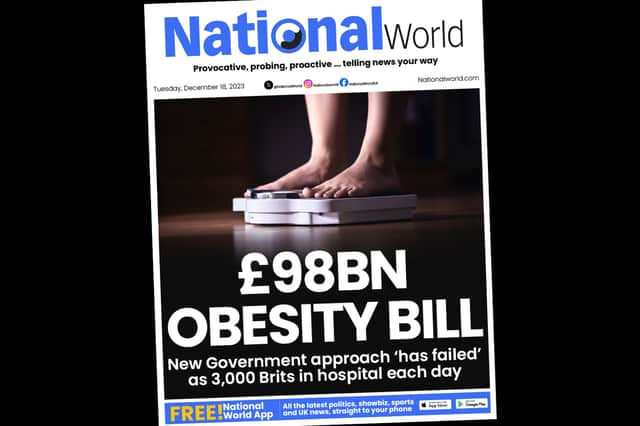Obesity: cost of people being overweight in the UK is almost £100bn a year


Britain is spending £98 billion as it attempts to tackle obesity, as the spiralling cost shows the growing prevalence of people being overweight is “an absolute public health disaster”, said Henry Dimbleby, the government’s former adviser on food.
The cost has risen from 58bn in 2020 to £98bn, according to the Tony Blair Institute. The costs to people affected rose from £45.2bn to £63.1bn a year, and the costs to the NHS from £10.8bn to £19.2bn, according to modelling undertaken for the thinktank by Frontier Economics.
Advertisement
Hide AdAdvertisement
Hide AdHowever, the biggest jump came in the cost of society as a whole, as a record 2.4 million people are now too sick to work, often as a result of being overweight or living with obesity - and have a financial rise of £2.1bn to £15.6bn. This also includes the value of health lost due to illness or weight-related disease.
“You’ve got a prime minister who for his own, I think, kind of personal aesthetics almost would rather try to deal with smoking, which he sees as bad even though it is now a tiny and disappearing problem, rather than food because he likes to drink Coke,” Dimbleby told a nutrition conference at the Royal Society on Monday.
Dimbleby, a co-founder of the Leon restaurant chain, said the food was a direct cause of three of the four main illnesses that are stopping the 2.4 million from working – type 2 diabetes, high blood pressure and musculoskeletal conditions – and exacerbated the other, mental ill-health.
He said that people need to break the "junk food cycle” and eat 30% more fruit and vegetables, 50% more fibre and 25% less food that is high in fat, salt or sugar. He has also urged for a nationwide drive to teach young people to cook while at school, to close the skills gap between those who can and cannot cook from scratch and to reduce the use of prepared food.
Advertisement
Hide AdAdvertisement
Hide AdDimbleby says the government would be wiser to tackle the food industry and promote the uptake of fresh food. It was “dystopian” to think that as many as one in three Britons could end up being on drugs such as Ozempic and Wegovy, he added.
Katharine Jenner, the director of the Obesity Health Alliance, said: “The huge increase in costs to £98bn, which now takes into account the value of health lost through illness and disease, is particularly striking as it has risen during a time the government has had a plan to address obesity – and failed to enact it.
“Thirty years ago, half of us were living with overweight or obesity, and now it is two-thirds of the population. In those 30 years, our food environment has changed beyond recognition into an obesogenic environment. It is not that our genes have changed but that we are surrounded by unhealthy food at every turn – on TV, in the shops, on our high streets and in our workplaces.
“If we only attempt to treat people without changing the environment that made them ill in the first place, we will simply be spending huge amounts of extra money in the NHS for little to no long-term benefit.”
Comment Guidelines
National World encourages reader discussion on our stories. User feedback, insights and back-and-forth exchanges add a rich layer of context to reporting. Please review our Community Guidelines before commenting.
